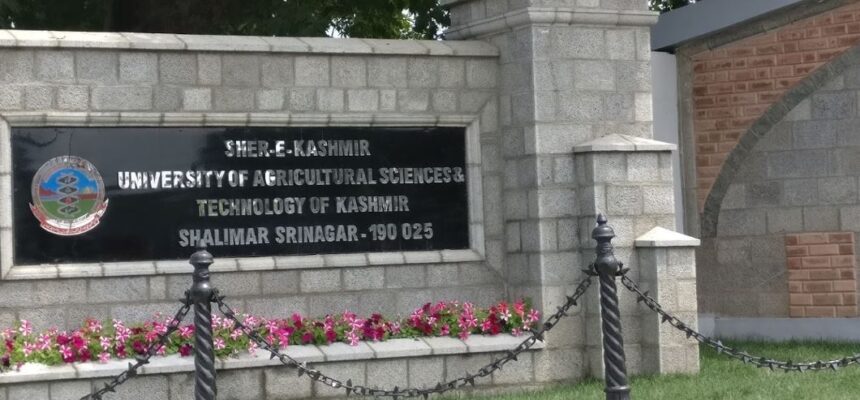Srinagar, April 29: The Institute of Business and Policy Research (IBPR), Sher-e-Kashmir University of Agricultural Sciences and Technology of Kashmir (SKUAST-Kashmir), Tuesday organised a day-long capacity building programme titled—’Enhancing Apple Value Chain Efficiency through Grading and Cold Chain Infrastructure’ on April 29. The event was conducted under the Holistic Agriculture Development Programme (HADP) project titled, ‘Strengthening Agriculture Marketing in Union Territory of J&K (HADP 04)”, at the University’s main campus, Shalimar. The programme brought together a diverse group of stakeholders including officers from the department of Horticulture Planning and Marketing, agri-business professionals, researchers, supply chain experts and policymakers to deliberate on key challenges and strategic interventions needed to strengthen the apple sector in Jammu and Kashmir. The event was jointly inaugurated by Prof. Nazir Ahmad Ganai, Vice-Chancellor, SKUAST-Kashmir and Ghulam Jeelani Zargar,, Director, Horticulture Planning and Marketing, along with senior officers and faculty of SKUAST-Kashmir.
Prof. Farhet A. Shaheen, Principal Investigator of HADP 04, in his address outlined the transformative potential of upgrading the apple value chain through science-led interventions and strategic infrastructure investments. “Apple is not just a fruit in J&K, it is a pillar of rural livelihoods, farm incomes and our identity in national and international markets,” he said. Prof. Shaheen emphasised the integration of grading, packaging and cold chain systems as critical components of HADP flagship horticulture initiatives, urging stakeholders to leverage the available support mechanisms for maximum impact.
In his address, Ghulam Jeelani Zargar, stressed the urgent need to modernise post-harvest management systems to improve efficiency and profitability across the apple value chain. Kashmir’s apple sector holds immense potential, but unlocking it requires moving beyond traditional practices, he said. “We must scale up modern grading, scientific packaging, and an integrated cold chain infrastructure to meet both national and international standards, he said. He also highlighted several initiatives undertaken by the Department under the UT Government’s vision for agricultural transformation, including the development of Controlled Atmosphere (CA) stores, pack-houses, market infrastructure, and farmer capacity-building programs. He congratulated the IBPR team for organising a timely and transformative program aimed at grassroots impact.”
Prof. Nazir Ahmad Ganai accentuated the strategic importance of innovation and infrastructure in sustaining the global relevance of Kashmir’s apple industry. He said that our apple industry is a cornerstone of the region’s economy. To remain competitive, we must shift from volume-based production to value-based systems. He also outlined SKUAST-Kashmir’s vision of a knowledge-driven ecosystem where research, policy, technology, entrepreneurship, and extension work in synergy to empower farming communities. He urged the officers of the line departments to work with zeal and dedication to enhance the efficiency and effectiveness of the market ecosystem through the implementation of technology and policies at the grassroots level. The program was coordinated by Dr. Abid Sultan, Assistant Professor, IBPR, along with the HADP project team. The event concluded with a formal vote of thanks by Dr. Farheen Naqash, Assistant Professor, IBPR. The current capacity building program marked a significant step towards empowering value chain actors in J&K’s horticulture sector to access high-value markets through improved quality, reduced losses and enhanced infrastructure.








